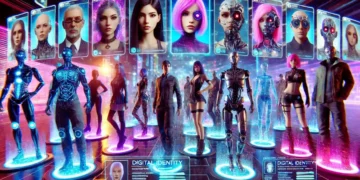Facebook and Instagram’s parent company Meta is working on a new artificial intelligence system in their secret lab that aims to be more powerful than OpenAI’s leading ChatGPT model. Codenamed “Llama 3”, Meta hopes this new generative AI will be ready by 2024 and several times more advanced than their current Llama 2 system.
Meta’s Ambitious AI Goals
Meta has ambitious goals for Llama 3. According to inside sources, the company wants the new model to be on par with OpenAI’s upcoming GPT-4 in terms of capabilities. GPT-4 is estimated to have 1.5 trillion parameters, making it over 20 times more powerful than the 70 billion parameter Llama 2.
To achieve this massive boost in power, Meta has already begun expanding its data centers and acquiring more advanced AI training chips like the Nvidia H100. The model training is expected to start in early 2024, likely putting it on track for release later that year.
While Llama 3 may match GPT-4’s raw abilities, it could still lag behind in real world performance. OpenAI has a headstart in developing commercial applications and fine-tuning models like GPT-4 for specific tasks. Still, Meta is committed to pushing the boundaries of generative AI.
Dueling AI Approaches: Open vs Proprietary
Meta’s open source approach differs from its rivals. Both OpenAI and Google are keeping their latest generative models like GPT-4 and Gemini closed source. In contrast, Meta plans to release Llama 3 publicly like it did with Llama 2.
Zuckerberg believes open sourcing AI delivers greater accessibility and customization. Developers can freely build on open models instead of paying for API access. This aligns with Meta’s focus on enabling others to create AI-powered products and services.
However, proprietary models have advantages too. Closed systems allow tighter control over harmful content and commercial exploitation. Open AI systems carry higher misuse risks that some experts warn could outweigh the benefits.
It remains to be seen which approach will win out long term. For now, generative AI competition is fueling rapid progress across both open and closed paradigms.
The AI Arms Race Intensifies
Meta’s new model is part of an escalating AI arms race among tech giants. After OpenAI’s ChatGPT sent shockwaves through the industry, rivals like Meta and Google scrambled to close the gap.
Generative AI promises to transform areas like search, content creation and customer service. These capabilities could decide the future winners and losers in tech. Hence the massive investments by companies to develop ever more powerful AI foundations.
For Meta, generative AI supports its metaverse ambitions. Zuckerberg sees AI assistants and content creators as key to populating virtual worlds. More broadly, advanced AI aligns with Meta’s mission of developing next-gen social connection platforms.
Yet catching up to OpenAI and Google won’t be easy. Meta’s late start puts it behind in training data, model optimization and productization. Outpacing the current leaders will likely require major resource commitments even for giants like Meta.
What Will Llama 3 Enable?
As a general purpose model, Llama 3 could fuel AI advancements across Meta’s family of products:
- Enhanced Creation Tools – More natural text, image, audio and video generation for ads, posts, stories and other content.
- Smarter Recommendation Engines – Better understanding of user interests and connections for suggesting relevant content and connections.
- Improved Search and Discovery – More semantic search and ability to synthesize responses versus just retrieving matching results.
- Bolstered Safety Efforts – Identifying policy violating content generated by AI and helping address harmful misuse cases.
- New Social Experiences – Richer AR/VR spaces and assistants, avatar customization, collaborative creation tools.
- Expanded Business Services – AI API access and integration for apps and sites to utilize natural language, speech, image and multimodal capabilities.
Of course, full implications remain hard to predict before models are actually built and tested. But if achieved, Llama 3’s boosted abilities could significantly impact Meta’s offerings and direction.
The Risks and Challenges of More Powerful AI
Pursuing more advanced generative models also comes with downsides and difficulties. Some key issues Meta will need to manage:
- Misuse potential – More capable creative AIs increase risks around spreading misinformation, hate speech, copyright issues, and other harms.
- Data limitations – Training extremely large models requires massive datasets which can be costly and difficult to acquire.
- Infrastructure demands – Running these AI systems necessitates specialized high-performance hardware that strains even tech giants’ resources.
- Control dilemmas – Balancing openness for innovation against security and oversight is an ongoing struggle for generative AI.
- Ethical considerations – There are unresolved debates around AI bias, transparency, accountability and other issues to address.
Overcoming these hurdles is key to realizing advanced generative AI’s potential while minimizing the pitfalls. And collaboration across the tech industry is likely needed to entirely solve challenges like misuse and bias.
The Future of Generative AI
While Meta aims to push boundaries with models like Llama 3, it’s unlikely the progress will end there. Experts predict capabilities will continue advancing at a rapid pace in coming years across metrics like parameter count, multi-modality, reasoning and beyond.
Where exactly this AI trajectory leads remains uncertain. OpenAI CEO Sam Altman believes within 5 years there will be digital assistants as capable as humans in key ways. Other experts argue we are still decades away from artificial general intelligence on the level of people.
But whether narrowly focused or general, smarter AIs are coming. And Meta is gearing up on the frontlines of this transformative technology race. If Zuckerberg’s bet pays off, elevated machines like Llama 3 could reshape the social media landscape and propel his metaverse vision. But there are sure to be surprises, setbacks and unintended impacts along the way.
Conclusion
Meta finds itself in an increasingly competitive generative AI race with the likes of Google and OpenAI. Despite being the latecomer, Meta is now pushing aggressively into large language model development in hopes of gaining ground with creations like Llama 3.
Success is far from guaranteed, but Meta’s open source approach combined with its massive resources give it a fighting chance to become a leader. At the very least, Meta’s efforts appear poised to produce some of the most powerful generative AI yet seen.
But perhaps more important than any one model is the rapid acceleration of AI capabilities as a whole. We are witnessing the beginnings of an intelligence revolution, and whichever company builds the most advanced AI first may gain an insurmountable advantage. The rest of the decade will reveal whether Meta can make the leap from follower to frontrunner as the next generation of artificial intelligence emerges.
More info: www.wsj.com
FAQs
How powerful will Llama 3 be?
Meta aims to make Llama 3 as capable as OpenAI’s GPT-4 model, which is estimated to be over 20x more powerful than Meta’s current Llama 2 system.
When will Llama 3 be released?
Internal plans are to begin training the model in early 2024, suggesting it could be released later that same year.
What is Meta’s approach to developing AI models?
Meta focuses on open source models anyone can use, whereas rivals like OpenAI and Google keep their models proprietary.
What will Llama 3 enable Meta to do?
The enhanced generative capabilities could improve Meta’s products in areas like content creation, recommendations, search, ads, and experiences in VR/AR.
Does Meta have any advantages in the AI race?
Meta’s open source direction, along with its vast data and resources, give it certain strengths. But established efforts by competitors put Meta behind in some respects.
What are the risks and challenges of more advanced AI models?
A: Major concerns include misuse potential, data/compute limitations, uncontrolled impacts, as well as ethical issues around transparency and bias.
Follow us on our social networks and keep up to date with everything that happens in the Metaverse!
Twitter Linkedin Facebook Telegram Instagram Google News Amazon Store












































